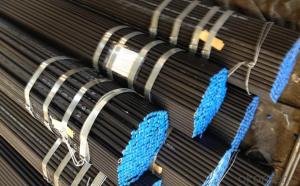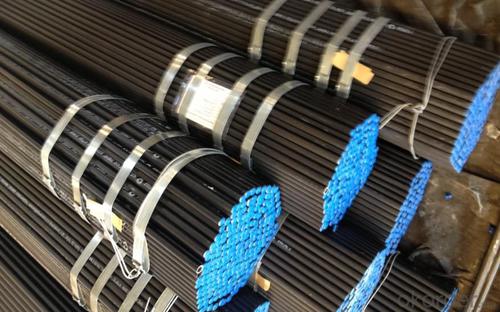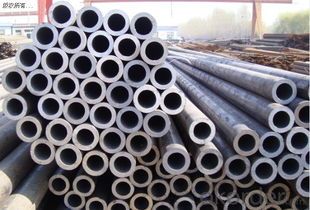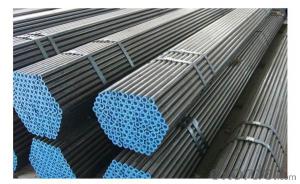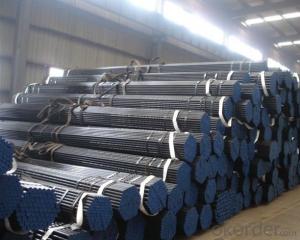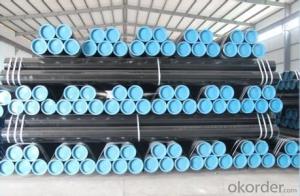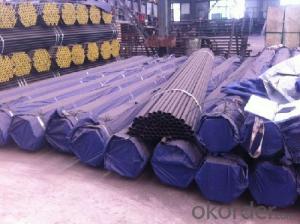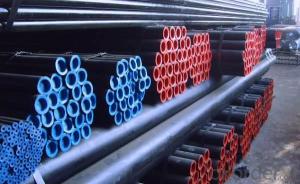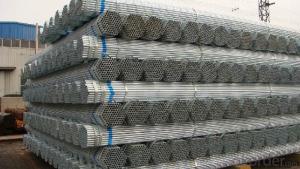CARBON STEEL SEAMLESS PIPE ASTM A53/A106 1 Inch
- Loading Port:
- China Main Port
- Payment Terms:
- TT or LC
- Min Order Qty:
- 25 m.t.
- Supply Capability:
- 1000 m.t./month
OKorder Service Pledge
OKorder Financial Service
You Might Also Like
Product Description:
1、Structure of CARBON STEEL SEAMLESS PIPE ASTM A53/A106 1 Inch:
Seamless pipe is formed by drawing a solid billet over a piercing rod to create the hollow shell. As the manufacturing process does not include any welding, seamless pipes are perceived to be stronger and more reliable. Historically seamless pipe was regarded as withstanding pressure better than other types, and was often more easily available than welded pipe.
2、Main Features of CARBON STEEL SEAMLESS PIPE ASTM A53/A106 1 Inch:
• High manufacturing accuracy
• High strength
• Small inertia resistance
• Strong heat dissipation ability
• Good visual effect
• Reasonable price
3、CARBON STEEL SEAMLESS PIPE ASTM A53/A106 1 Inch Images:
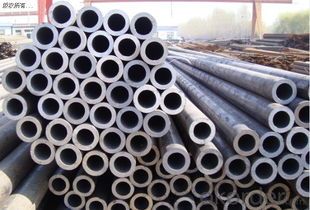
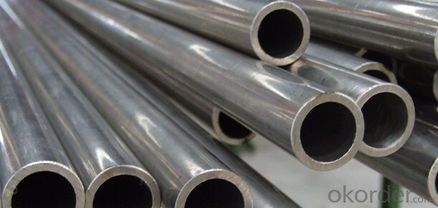
Packaging & Delivery
Packaging Details: | seaworthy package,bundles wrapped with strong steel strip |
Delivery Detail: | 15-30days after received 30%TT |
4、CARBON STEEL SEAMLESS PIPE ASTM A53/A106 1 Inch Specification:
Standard | GB, DIN, ASTM |
Grade | 10#-45#, 16Mn |
Thickness | 8 - 33 mm |
Section Shape | Round |
Outer Diameter | 133 - 219 mm |
Place of Origin | Shandong, China (Mainland) |
Secondary Or Not | Non-secondary |
Application | Hydraulic Pipe |
Technique | Cold Drawn |
Certification | API |
Surface Treatment | factory state or painted black |
Special Pipe | API Pipe |
Alloy Or Not | Non-alloy |
Length | 5-12M |
Outer Diameter | 21.3-610mm |
Grade | 20#, 45#, Q345, API J55, API K55, API L80, API N80, API P110, A53B |
Standard | ASME, ASTM |
1.Material:20#(ASTM A 106/A53 GRB.API5LGRB,GB),45#,16Mn,10#.
2.Specification range:OD:21.3-610mm,WT:6-70mm,length:6-12m or according to the requirement of clients.
3.Excutive standards:GB,ASME API5L.ASTM A 106/A53,Despite of the above standards,we can also supply seamless steel pipe with standard of DIN,JIS,and so on,and also develop new products according to the requirements of our clients!
4.Surface:black lacquered,varnish coating or galvanized.
5.Ends:Beveled or square cut,plastic capped,painted.
6.Packing:bundles wrapped with strong steel strip,seaworthy packing.
5、FAQ of CARBON STEEL SEAMLESS PIPE ASTM A53/A106 1 Inch:
①How is the quality of your products?
Our products are manufactured strictly according to national and internaional standard, and we take a test
on every pipe before delivered out. If you want see our quality certifications and all kinds of testing report, please just ask us for it.
Guaranteed: If products’ quality don’t accord to discription as we give or the promise before you place order, we promise 100% refund.
②How about price?
Yes, we are factory and be able to give you lowest price below market one, and we have a policy that “ for saving time and absolutely honest business attitude, we quote as lowest as possible for any customer, and discount can be given according to quantity”,if you like bargain and factory price is not low enough as you think, just don’t waste your time.Please trust the quotation we would give you, it is professional one.
③Why should you chose us?
Chose happens because of quality, then price, We can give you both.Additionally, we can also offer professional products inquiry, products knowledge train(for agents), smooth goods delivery, exellent customer solution proposals.Our service formula: good quality+good price+good service=customer’s trust
SGS test is available, customer inspection before shipping is welcome, third party inspection is no problem.
Any question, pls feel free to contact us !
- Q: What does GALV mean in a steel tube?
- Steel pipe is not only used to transport fluid and powder solid, exchange heat energy, and manufacture mechanical parts and containers, but also is an economic steel. It can reduce weight and save 20 to 40% of metal by using steel pipe to make building structure, network frame, prop and mechanical support. Moreover, it can realize factory mechanization construction. Using steel pipe to manufacture road bridge can not only save steel, simplify construction, but also greatly reduce the area of coating protective layer, save investment and maintenance cost.
- Q: How are steel pipes coated to prevent corrosion?
- Steel pipes are coated to prevent corrosion using various methods and materials. One common method is applying a protective layer of paint or epoxy on the surface of the pipe. This coating acts as a barrier between the steel and the external environment, preventing moisture and corrosive substances from coming into direct contact with the metal. Another technique involves using a process called galvanization, where the steel pipes are coated with a layer of zinc. Zinc is highly resistant to corrosion and acts as a sacrificial anode, meaning it will corrode in place of the steel if any damage occurs to the coating. This sacrificial protection ensures that the steel remains intact and corrosion-free. Additionally, steel pipes can be coated with polyethylene or polypropylene materials through a process called fusion bonding. In this method, the plastic material is melted onto the steel surface, creating a strong bond that provides excellent resistance against corrosion. This type of coating is commonly used in offshore and underground pipelines. Furthermore, another technique for preventing corrosion is the application of a layer of corrosion-resistant alloy onto the steel pipe. This alloy is typically a combination of metals such as nickel, chromium, and molybdenum, which provide superior protection against corrosion in harsh environments. Overall, the choice of coating method depends on various factors such as the operating conditions, the type of corrosive substances present, and the expected lifespan of the steel pipes. By effectively applying these coatings, steel pipes can be safeguarded against corrosion, extending their durability and ensuring the integrity of the infrastructure they are used in.
- Q: How are steel pipes used in the manufacturing of boilers and heat exchangers?
- Steel pipes are an essential component in the manufacturing of boilers and heat exchangers due to their unique properties and capabilities. These pipes are specifically designed to withstand high temperatures, pressures, and corrosive environments, making them ideal for these applications. In the manufacturing process of boilers, steel pipes are used to construct the main body or shell of the boiler. This shell contains the water or steam that is heated to generate heat or produce steam for various industrial processes. The steel pipes used in boilers are typically seamless or welded, with precise dimensions and high strength to ensure structural integrity and prevent leaks. Heat exchangers, on the other hand, are devices used to transfer heat between two fluids, often with different temperatures. Steel pipes are employed in heat exchangers as the primary medium for transferring heat. The pipes are usually arranged in a pattern, allowing the hot fluid to pass through one set of pipes while the cold fluid passes through another set. This arrangement enables efficient heat transfer between the two fluids. The use of steel pipes in boilers and heat exchangers offers several advantages. Firstly, steel pipes have excellent thermal conductivity, allowing for efficient heat transfer between the fluid and the surrounding environment. Secondly, steel pipes have high tensile strength and can withstand high pressure, ensuring the safety and reliability of the equipment. Thirdly, steel pipes are resistant to corrosion, which is crucial in environments where the fluids being processed are corrosive or contain impurities. Moreover, steel pipes can be easily fabricated and customized to meet the specific requirements of boilers and heat exchangers. They can be manufactured in various sizes, lengths, and thicknesses to accommodate different applications. Additionally, steel pipes can be coated or lined with materials such as ceramic or epoxy to provide further protection against corrosion or abrasion. In summary, steel pipes play a vital role in the manufacturing of boilers and heat exchangers. Their unique properties, including high strength, thermal conductivity, and corrosion resistance, make them the ideal choice for these applications. The use of steel pipes ensures the efficient operation, safety, and longevity of boilers and heat exchangers in various industrial processes.
- Q: Can steel pipes be used for wastewater treatment systems?
- Yes, steel pipes can be used for wastewater treatment systems. Steel pipes are commonly used in wastewater treatment systems due to their durability, corrosion resistance, and ability to withstand high pressures and temperatures. Additionally, steel pipes can be easily welded and have a long lifespan, making them a suitable choice for transporting and distributing wastewater within treatment facilities.
- Q: How are steel pipes used in the aerospace manufacturing industry?
- Steel pipes are used in the aerospace manufacturing industry for a variety of applications, including fuel and hydraulic systems, structural components, and engine parts. They provide durability, strength, and corrosion resistance, ensuring the safety and reliability of aircraft.
- Q: Are steel pipes suitable for transporting gas?
- Yes, steel pipes are suitable for transporting gas. Steel pipes are known for their durability and strength, making them ideal for transporting gas safely over long distances. They are resistant to corrosion and can handle high pressure, making them a reliable choice for gas transportation.
- Q: What is the hardness of steel pipes?
- The specific grade and manufacturing process can cause the hardness of steel pipes to vary. Generally, alloys are used to make steel pipes, which offer a combination of strength and toughness. To determine the hardness of steel pipes, different methods like Rockwell or Brinell hardness tests can be carried out. These tests gauge the steel's resistance to indentation or penetration using a standardized indenter. The hardness of steel pipes is usually represented as a numerical value on a scale, like the Rockwell hardness scale (e.g., HRC or HRB) or the Brinell hardness scale (e.g., HB). The hardness of steel pipes is significant as it indicates their capacity to endure physical stresses, such as pressure, impact, or wear, in various applications such as construction, oil and gas transportation, and manufacturing.
- Q: How are steel pipes repaired if they are damaged?
- Steel pipes can be repaired if they are damaged through various methods such as welding, patching, or replacing the damaged section with a new pipe. The specific repair technique depends on the extent and nature of the damage.
- Q: How are steel pipes stored and transported?
- Steel pipes are typically stored and transported in a systematic and efficient manner to ensure their safety and prevent damage. When it comes to storage, steel pipes are usually stacked horizontally or vertically in designated areas. If stacked vertically, they are often placed on custom-made racks or stands that provide support and prevent them from rolling or collapsing. This vertical stacking method saves space and allows for easy accessibility when needed. To protect steel pipes from corrosion and environmental elements, they are often coated with a layer of paint or other protective materials. Additionally, pipes are sometimes stored indoors in warehouses or storage facilities to shield them from adverse weather conditions. When it comes to transportation, steel pipes are typically loaded onto trucks, railcars, or ships depending on the distance and destination. Specialized equipment such as cranes or forklifts is used to handle and load the pipes onto the transportation vehicles. Pipes are secured tightly to prevent movement during transit using straps, chains, or braces. This ensures that the pipes remain stable and do not cause any damage to themselves or other cargo. For long-distance transportation, steel pipes are often transported in bundles or stacks, secured with additional reinforcements. Pipes may also be packed in protective coverings or containers to shield them from external factors such as moisture, dust, or impacts. Overall, the storage and transportation of steel pipes involve careful planning, proper handling, and appropriate protective measures to ensure their integrity and quality are maintained throughout the process.
- Q: What is the role of steel pipes in the transportation of chemicals?
- The role of steel pipes in the transportation of chemicals is to provide a strong, durable, and corrosion-resistant conduit for safely moving various types of chemicals from one location to another. Steel pipes are known for their high strength and ability to withstand high pressure, making them suitable for handling hazardous or aggressive substances. Additionally, the smooth interior surface of steel pipes minimizes friction, allowing for efficient and continuous flow of chemicals. The steel material is also resistant to chemical reactions, ensuring the integrity and purity of the transported substances. Overall, steel pipes play a crucial role in ensuring the safe and efficient transportation of chemicals, protecting both the environment and human health.
Send your message to us
CARBON STEEL SEAMLESS PIPE ASTM A53/A106 1 Inch
- Loading Port:
- China Main Port
- Payment Terms:
- TT or LC
- Min Order Qty:
- 25 m.t.
- Supply Capability:
- 1000 m.t./month
OKorder Service Pledge
OKorder Financial Service
Similar products
Hot products
Hot Searches
Related keywords
